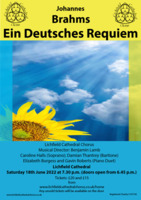Brahms: Ein deutsches Requiem ()
Written soon after his mother’s death in 1865 and first performed in its completed score in the famous Gewandhaus in Leipzig on Good Friday in 1868, Brahms’ Ein deutsches Requiem is a Requiem like no other and a masterpiece of choral composition.
Based on the text of the Lutheran Bible and offering hope and consolation to the living as well as mourning the departed, it is perhaps difficult to think of a piece of music more fitting for the times through which we are living. Lichfield Cathedral Chorus last sang the work in the magnificent setting of Rouen Cathedral in Northern France in 2017. Come and join us in what promises to be an unforgettable and thought-provoking evening as we bring the work back to Lichfield under the baton of Ben Lamb and in Brahms’ own arrangement for chorus, soloists and piano duet.
We have four great professional musicians joining us: Caroline Halls (Soprano); Damian Thantrey (Baritone); with Elizabeth Burgess and Gavin Roberts (piano duet).
Pieces
- Ein deutsches Requiem, Op.45 (1868) — Brahms
Venue
Lichfield Cathedral, The Close, Lichfield, WS13 7LD [map]
« Handel's Messiah (Apr 2022) ‖ Tidings of Great Joy (Dec 2022) »
Reviews
Review of Ein Deutsches Requiem (Johannes Brahms) by LCC June 2022
On 18 June 2022 Lichfield Cathedral Chorus performed Johannes Brahms Ein Deutsches Requiem (Op. 45) in an unusual version for piano duet — four hands, one piano — chorus and soloists. Brahms, himself, prepared this version, probably for private performances when a full orchestra was unavailable, from his orchestral score for the complete work. Nicknamed the ‘London version’ or ‘Londoner Fassung’, Gramophone (1997/2012)1 notes that the first concert of this version was given in July 1871 in the Wimpole Street house of a London surgeon, Sir Henry Thompson, whose wife, Kate Loder, a well-known pianist, shared the piano with Cipriani Potter, a former Principal of the Royal Academy of Music.
The two pianists for tonight’s concert, Libby Burgess and Gavin Roberts, opened the performance sonorously on the Cathedral’s beautiful Bechstein piano, and played sensitively or dramatically as needed throughout the performance. This version of the Requiem leaves the Chorus nowhere to hide, not that they needed it, as their diction of the German text was clear throughout and their intonation only occasionally drifted slightly when movements or passages ended softly.
The first movement was taken at a measured speed that seemed appropriate to the text and was beautifully shaped. The choir presented the text of sorrow with suitable feeling.
The heaviness of the material of the second movement was conveyed dramatically by the choir with appropriate contrasts of loud and soft passages. The second part was portrayed with a delightful change of tempo, leading into the joyful celebration of the ‘word of the Lord’.
The third movement opened with a great declaration by the Baritone soloist, Damian Thantrey, whose beautiful voice carried clearly and led into an exciting but well-balanced duet with the choir about the failings of human beings. As they considered their mortal end, the choir conveyed their sense of anguish, before celebrating the lot of the souls of the righteous in a rumbustious, rock-solid fashion.
After a brief pause, the choir moved on to celebrate lyrically the lovely dwellings of the fourth movement. In the beginning the choir sounded as though they were taking a stroll through a woodland glade but the speed and intensity picked up as they cried out for the living God, returning to their gentle stroll as they contemplated the blessings of those that dwelled therein. Like several of the movements it was beautifully shaped to fit the text.
The fifth movement, a late addition to Brahms’ initial version of the Requiem, showcased the delicately clear voice of Soprano soloist, Caroline Halls. Her beautiful sense of line and clear diction lit up the movement, carefully accompanied by the chorus, and provided a breath of lightness to the rest of the work.
My notes say ‘with cat-like tread’ as the choir and piano tip-toed purposefully into the sixth movement unravelling the mystery of life everlasting, a movement that took on greater urgency when Damian Thantrey sounded the last trumpet. As Death got its come-uppance the piano soloists were superb and the choir sounded as though they were mocking death and the grave. The choir and pianists strode through the last part of the movement, ‘thou art worthy, Lord’ with great purpose and joy.
The seventh movement was delicately and fittingly done, although I wish the men had been more fervent in the opening when replying to the women.
Overall, a really enjoyable performance of an unusual but authentic version of Brahms’ Requiem on which Ben Lamb, the Chorus and soloists are to be congratulated. It always was one of my favourite choral works. It still is.
1: Brahms Ein deutsches Requiem, Op. 45 (London version). Gramophone, Haymarket: 92, June 1997, reprinted 1 August 2012. [back]
Hugh Busher, June 2022
